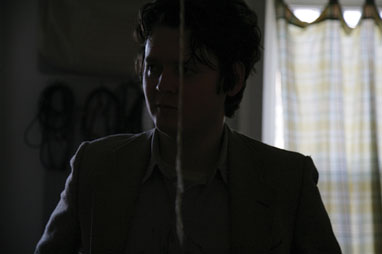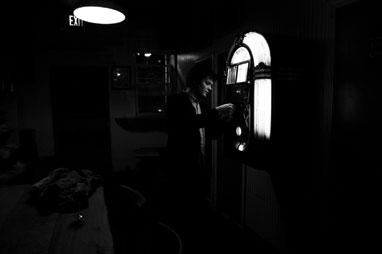Zach Condon grew up with a map on his bedroom wall and when he needed a name for Beirut, he picked it from there. He's since expanded his empire of city music through much of Europe, pretty much anywhere that loves an orchestra. But for his most recent release, March of the Zapotec, Condon got on a plane and headed south to the state of Oaxaca in Mexico to record his own version of their big brass band group blast. We spoke to Condon about that experience—and that of recording Zapotec's other half, the bubbly home-recorded Holland EP—for a cover story in our current issue 60.
Zach Condon plays music as Beirut, and in his brief career up until now he has released two widely loved albums, layering his opera croon over brass groups that mimic the international music he loves. Pale and babyfaced, the twenty-two-year-old sits in the hulking blue easy chair that he seems to spend a great deal of time in. Behind him is a fancy microphone stand, the microphone itself adjusted to his height while seated. In front of him is a Mac computer that he shuffles through unconsciously. Despite the worldliness of his oeuvre, Condon doesn’t seem to leave this filthy apartment on the cusp of Williamsburg, Brooklyn’s Hasidic community very often. He’s into Call of Duty and television. After we spend an hour listening to Middle Eastern 45s he picked up at a shop in Morocco on a recent vacation and watching a DVD of street musicians from there, he says most of his non-Beirut time is spent with friends doing not much more than this.
He is very matter of fact about his relationship with his music and his friends. When he shows me a YouTube video of kids in New Mexico playing Beirut-ish music with accordions and berets around a large wooden table, he bemoans the lingering influence he has had on that scene’s musical youth. He’s not disdainful, but he’s clearly not excited either, remaining skeptical about the musical possibilities he’s helped funnel into the community he came from. It’s the trendsetter’s eternal problem of beloved mimicry. He knows he’s not alone in making music with international traits, but he’s in a quagmire about being the guy to bring those obscurities to light. He shows me his plaque for earning a gold record in Belgium. It’s sitting on a keyboard, propped up against the wall. That’s a lot of popularity for a guy fearing the imminent Christmas time visit from his parents and the house cleaning that comes with it. He lives in these two different worlds simultaneously and not without some discomfort. Beirut and Zach Condon are not the same thing, but too often that line between mere mortal and cocky musician is blurred. When Condon tells a story about being extremely drunk and knocking over a beer while meeting Animal Collective after a show, I ask if he had introduced himself as Beirut. “People just always seem to know,” he says.
When he speaks about himself, it’s with a mix of hubris and honesty that is somewhat uncomfortable to listen to, but difficult to contradict. Is it still boasting if you’re just truth telling? Condon quit high school (later getting a GED) and then college to play music, always sure that he would succeed. “I put all my eggs in one basket really early on in life, so taking on a lifestyle seemed pretty natural, obviously exciting and enthralling and weird,” he says. “I had to learn all sorts of things and I had to be scared at different times, but it was understood that it was what I would go through.”

Three years into his Brooklyn life, Condon calls himself a New Yorker when traveling abroad, as many people of this cosmopolis do, no matter how long or short they’ve been here. Before moving to New York, Condon was from Albuquerque, where he recorded his first album, the Balkan-tinged Gulag Orkestar, in his bedroom. Like many young people who have moved to New York from the loose ends of the country’s artistic community, Condon is happy to have shed the sequestering of his small town upbringing. But he, like the rest of them, has found that traits from his hometown have made it deep into his nooks. When he traveled to Oaxaca in the deep south of Mexico to spend two weeks recording the March of the Zapotec side of his new double EP, Condon was pleased to find that it reminded him of his hometown. “The only difference is the bugs are a little bigger, and there are scorpions everywhere,” he says. Then he shows me a photo of him and a friend crouched and smiling beside a dead scorpion they’d killed with a tool for mashing corn.
Oaxaca is well known for its large mix of indigenous people—Mixtec and Zapotec being the most prominent—so there are a lot of non-Spanish speaking bilinguals. The city was originally settled and established because of the prevalence of the cochineal bug, a tiny insect that when crushed releases a deep red goo that is the source for clothing dye. More recently it was known for its ongoing teacher protests and the associated deaths in 2006. Condon mentions none of this history and instead speaks mostly of the difficulty in finding a stocked music shop that deep into the Mexican ether. Like always when working on new songs, most of his time was spent on the business of music.
During April of last year, Condon spent two weeks composing and collaborating with Banda Jimenez, a church-sponsored seventeen-piece orchestra of amateur musicians commissioned to be Beirut’s backing band on Zapotec, a situation Condon makes sound like the most natural thing in the world. And it kind of was.
A prolific musician, because of both bored and creative propulsions, Condon was tiring of his own schtick. “I get sick of hearing myself play trumpet. I get sick of hearing my voice in every song. The way I voice piano, the way I voice accordion, the way I voice trumpet, ukulele,” he says. “I was running out of ideas. So I really wanted to collaborate with a big brass brand.” Fortuitously, in September of 2007, Kary Fukunaga, a friend of Condon’s, asked him if he could write a soundtrack to a film based in Oaxaca and passed along a recording of music from the area. Condon was “not in the mood” to record such somber, string-laden music and passed. But the misplaced, dry chomp of it intrigued him. “I wanted that big nasty dirge sound,” he says. “I wanted that bass drum and cymbal, and I wanted that lurching tempo shift, and I wanted those little clarinet squeaks and mistakes.” He tried to mimic the music’s ragged playing with his group in New York but found the results disingenuous, so he decided to go to Mexico and record. Condon remembered that the mother of Jon Natchez, one of his bandmates, lived in Oaxaca for half of the year and he got word to her that he was looking to play with musicians there. She connected him with Tomàs Mendoza—a weaver and something of the people’s mayor, who speaks Zapotec, Spanish and English—who assured Condon that he could find a group to be at his disposal. They agreed on a price and Condon, along with collaborators Griffin Rodriguez and Perrin Cloutier, flew south for two weeks of recording with the promise that Banda Jiminez would gather at Condon’s rented house every evening after siesta, ready to play. But upon arrival, Condon learned that the band would only work from sheet music, something they had been unprepared for. “Everyone was just dumbfounded, so we realized we had to write it all out,” Condon says. “It’s not like I was working with seasoned jazz musicians who are improvising where you don’t tell them what to do. If you don’t tell them to do something, that part remains blank.”
Despite these initial communicational and organizational difficulties, the resulting songs on March of the Zapotec are fully orchestral pieces. Beirut’s last two albums have been elaborate works, full of clarinet, bass and other odds and ends played by Condon’s friends far and local, along with mythical lyrics written by Condon’s brother Ryan. Beirut was a worldly endeavor on its surface, but still a direct evocation of Condon’s interests and impulses. March of the Zapotec finds him giving up some control and submerging in the beefy Mexican tones he could not coax from himself. Until now, because he didn’t know any better, he was able to ignore the osmosis of sound that happens because of a recording’s setting. Gulag Orkestar sounds unfully Balkan, not because of Condon’s then lack of nineteen-year-old talent, but because he made it in his bedroom in New Mexico. Zapotec is as much a graduation of Beirut’s musical sensibilities as it is Condon’s composer’s impulses. Now, after two successful self-made albums, he’s trading on own earned credibility to give the unknown originators he loves the space and attention they deserve.
But back in New York after such an encompassing production, Condon was exhausted by and unsure about the songs. He had thrown himself into weeks of writing and recording, working from five to midnight with the band, and midnight to four with Cloutier and Rodriguez, and after leaving Oaxaca the music sounded out of place. “I came back and was thinking to myself, ‘That might have been a failure, I might have to chalk that off as something I won’t be able to finish,’” Condon says. Until then he’d always been completely confident with his music, but in the open time of home, he was unsure if what he traveled two thousand miles to get was worth leaving New York for. Needing a break, he took a vacation to Paris where he had promised a friend that he would sing at his wedding. Then he traveled down to Morocco, purposefully leaving behind the Oaxaca recordings so he would not be tempted to listen. When he returned to Brooklyn, he heard them with renewed ears. “I couldn’t figure out if I was just growing up, if music reacted differently to me, or if it was weak material, but after the month it seemed good again,” he says. So he set out to record vocals, sitting in the easy chair in front of his computer, next to a dusty window with a distinctly urban view of elevated train tracks. And as if to deemphasize himself, Condon only sings over half of the six songs on Zapotec. And without his signature operatic trill lolling above the pomp, the songs are often unrecognizable as Beirut.

While slowly finishing the Zapotec sessions, Condon found himself with spare melodies accumulating and started recording songs quickly as clearing sessions for his mind. Condon decided to explore his more pop side, calling himself Realpeople, a sidestep away from Beirut’s globetrotting. The resulting EP, called Holland, is a wild mix, mostly centered around diddling melodies played on computer programs. They all have a novice, if not particularly raw, feel, like Condon is singing through gritted teeth over a tweaked keyboard preset. “No Dice,” the album’s last song, was created by Condon on a bootleg copy of the Fruity Loops beat making program when he was fifteen. An uptempo track that doesn’t really go anywhere during its five minutes, the song is, simply put, not very good. Condon cannot talk about it without laughing and even he is not sure if its inclusion is a joke. “I used to put this on in my car and just drive around Santa Fe late at night,” he says and then he proudly hums along. But the other Realpeople songs are not self-indulgent experiments. “The Concubine” is a synthesis of all things Beirut. Beginning with a plodding accordion and the layered ding of a hotel desk bell and building with the slow addition of a measured marching drum snare and sexy trumpet, the song steadies itself with Condon’s crow’s call. It is the newest song he’s finished and his voice has matured, emerging as bittersweet and no longer showy. There are airs of Paris and Venice in the song’s breeze, but it is without specific cultural distinction, something that, in the long run, would have begun to weigh down Beirut. Though there is undoubtedly grand tradition in the international music Condon has mined, he knows the world’s fruits are not simply his for the picking. “When people ask me, ‘What are you going to do next? What country are you going to visit?’ it makes me feel weird,” he says.
In the shower, a few days after I’ve last heard it, I get a couple of seconds of the trumpet from March of the Zapotec’s “La Llorna” stuck in my head, but at the time I can’t place where it comes from. Is it Athens, Georgia indie rock from the mid-’90s, with its melodramatic funereal orchestral backing? Or is it the hazy brass of a maniacal Don Cherry album? I think it’s possibly French, some lurching bridge of a Serge Gainsbourg song. But then I realize it is Beirut. But it doesn’t sound Mexican. It sounds of no particular origin, the anonymous and unsymbolic blat of mouths on mouthpieces. This is, in one way, a simple, potential critique of Condon’s music: the pilfering of international motifs and siphoning of them through a naïve palette into a narrativeless, puddle-jumping amalgam. But Beirut’s music benefits from an open borders world. In the unworldly way that a college-aged kid can question the inherent language of sound and centuries deep weavings of a geographically-specific culture, Condon has fused nations through his singular, absorbent quest for rich sound. It’s not a small task for anyone, but maybe it’s not an impossible one for someone who doesn’t have enough experience with life’s failures to stop him from trying.



